Modern digital business operations make data analytics the essential competitive strategy that eCommerce organisations need to develop. Organisations should use data analytics to analyse customer records alongside insights for making strategic business decisions that optimise their marketing initiatives and delivery operations. The difficulty of finding expert opinions increases because many blogs exist for analysis purposes. This article identifies twelve significant platforms which host eCommerce data analysis software providing data on marketplace trends together with tools and method guidance. The blogs offer complete data about customer segmentation while sharing both conversion rate optimisation techniques and AI-based predictive analysis guidelines.
Users at all professional levels obtain access to tools through these resources that facilitate eCommerce business growth through data utilisation. Blogs subscribed by professionals allow them to access practical examples of recent analytics data patterns alongside expert psychological techniques. Blogs enable users to learn about data analytics systems by teaching them basic Google Analytics tools in addition to advanced AI solutions that improve eCommerce business efficiency. The subsequent part investigates essential resources that enable your leadership in eCommerce market competition.
What is eCommerce Data Analytics & why it’s important?
The segment describes essential eCommerce data analytics elements alongside their fundamental value. Web shopping data collection allows performance assessment of business operations by decoding customer interactions and measuring business productivity. The measurement system within the tracking system provides website traffic data together with conversion statistics and information about abandoned cart events, as well as customer life value analytics and product evaluation data.
The digital marketplace depends on crucial business choices that develop their methods through data-based approaches. Organisations operate without analytics tools through data insights to help identify growth potential and achieve maximum operational efficiency. eCommerce analytics enables organisations to develop superior marketing approaches and superior customer service and enhance business results. Data utilisation for long-term business achievement allows organisations to both personalise their operations, establish optimal pricing strategies and create accurate market trend predictions.
Key Benefits of eCommerce Data Analytics Software
- Better Customer Insights: Organizations acquire consumer preference details through the combination of buying behaviour analysis and demographic information databases.
- Improved Marketing Strategies: The analysis system enables businesses to reach marketing success through strategic planning of their advertising expenditures.
- Higher Conversion Rates: Teams can identify and correct every performance limitation within the sales funnel because of better overall operation.
- Efficient Inventory Management: Organizations prevent stockout events through demand forecasting methods that stop both stockout problems and avoid product overstocking situations.
- Enhanced Customer Experience: Personalize recommendations and support.
- Competitive Advantage: A company needs market analysis of competitive movements and market dynamics to maintain its leadership standing.
List of Top 12 eCommerce Data Analytics Software
1. Google Analytics 4 (GA4)
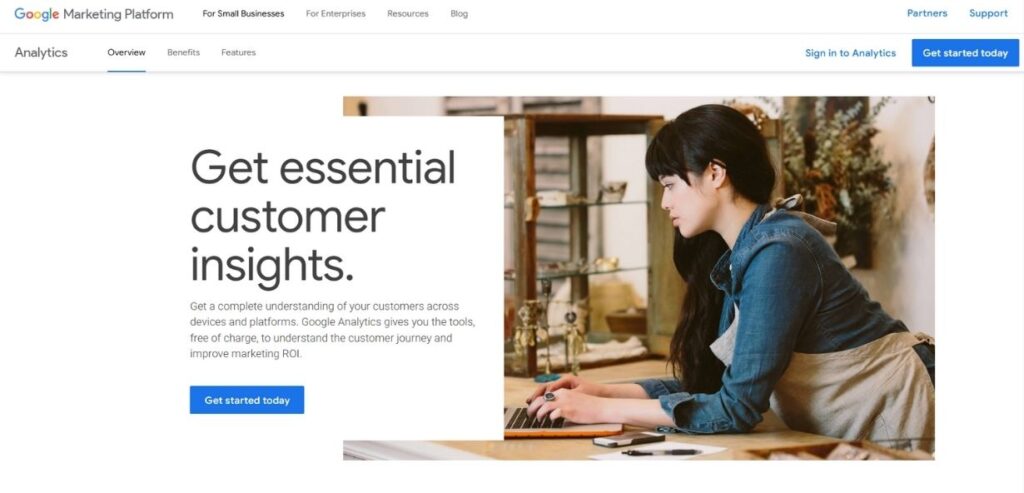
Every user can access the GA4 platform without fees to monitor visitor behaviours as well as conversion metrics and navigation patterns. Users can optimise their marketing through enhanced user experience using artificial intelligence analysis and device and event-based eCommerce data analytics collection across platforms through this solution. Businesses leverage this platform to track user movement among devices as well as platforms which makes it an essential instrument for proof-based decision-making.
Key Features:
- Event-based tracking for better insights
- AI-powered predictive metrics
- Cross-device and cross-platform tracking
Pros:
- Free to use
- Deep integration with Google Ads
- Advanced reporting features
Cons:
- Steep learning curve
- Limited historical data migration
- Complex event setup
Pricing: Free
Website: www.google.com/analytics
2. Adobe Analytics
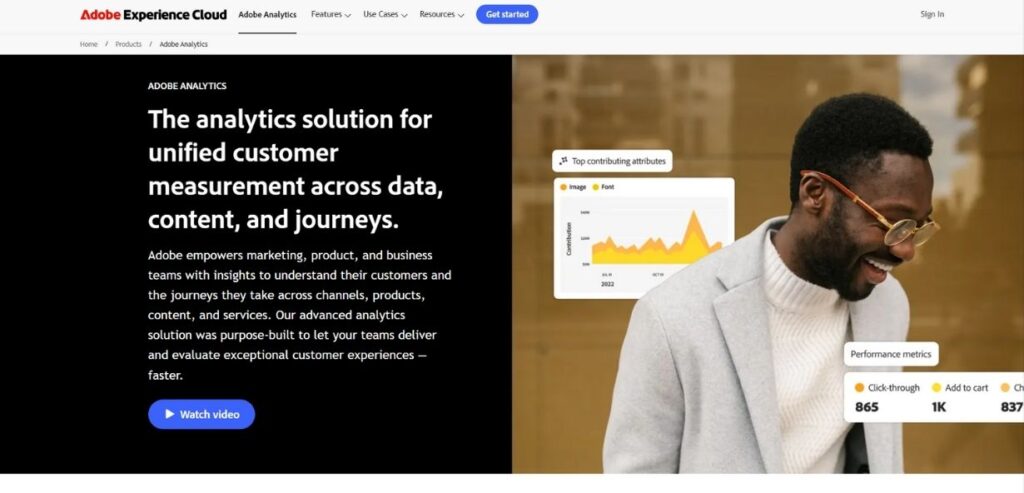
The platform uses AI capabilities in its engines to produce reports. Businesses utilize person movement tracking capabilities in digital analytics to improve their digital marketing strategy development. Adobe ecosystems act together to give users complete system interaction data reports.
Key Features:
- AI-driven predictive analytics
- Advanced segmentation and real-time insights
- Seamless integration with Adobe Cloud
Pros:
- Robust data visualisation
- AI-powered recommendations
- Real-time data processing
Cons:
- Expensive for small businesses
- Complex setup process
- Requires technical expertise
Pricing: Custom pricing
Website: www.business.adobe.com/products/adobe-analytics.html
3. Shopify Analytics
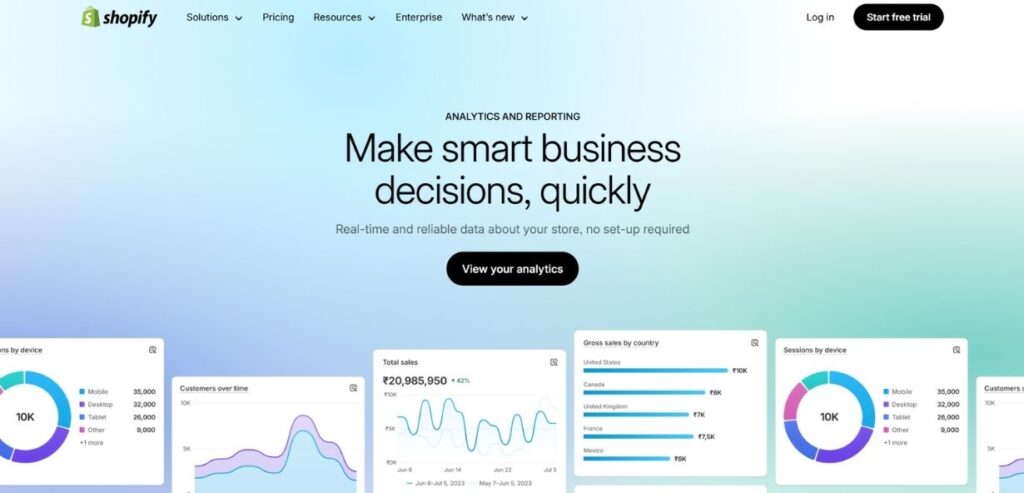
The platform contains Shopify Analytics, which serves as the built-in analytical instrument for Shopify shop operators. The platform reveals information about business sales in addition to customer behaviour and marketing success metrics. Retailers who use Shopify need this platform because it generates detailed reports that evaluate store activities alongside customer acquisition metrics and conversion statistics.
Key Features:
- Real-time sales and performance tracking
- Customer and marketing reports
- Built-in dashboard with customisable insights
Pros:
- Native Shopify integration
- User-friendly interface
- No extra cost for basic reports
Cons:
- Limited customisation options
- Advanced reports require higher-tier plans
- Lacks deep AI-driven insights
Pricing: Included in Shopify plans (from $39/month)
Website: www.shopify.com
4. Kissmetrics
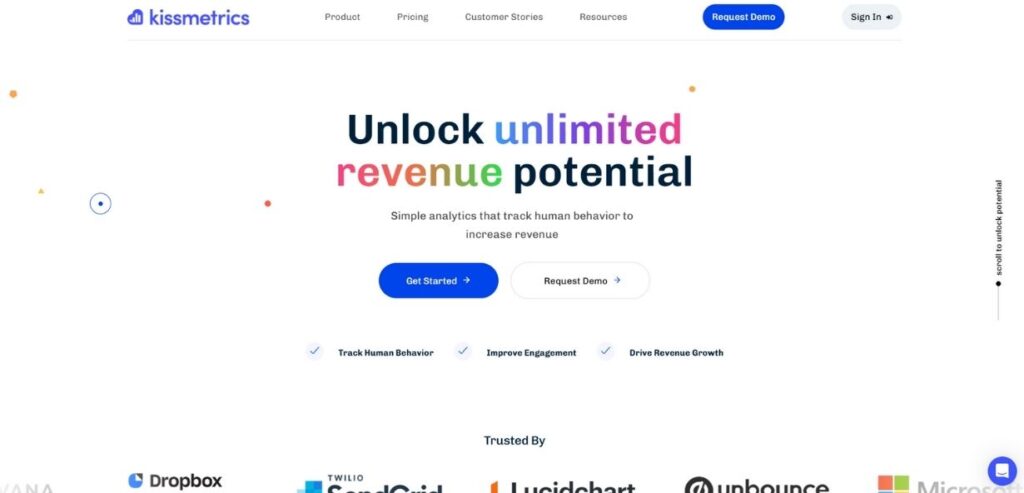
Kissmetrics provides customer engagement analytics capabilities because it tracks user pathways to maintain meaningful data metrics. The eCommerce data Analytic system tracks customer interactions for both group segment recognition of high-value clients and for marketing enhancement to maximise conversion rates.
Key Features:
- Customer journey tracking and funnel analysis
- Behavioural segmentation and cohort analysis
- Email and engagement automation
Pros:
- In-depth customer behaviour analysis
- Excellent retention tracking
- Strong marketing automation features
Cons:
- Expensive for small businesses
- Requires technical setup
- Limited integrations
Pricing: Starts at $299/month
Website: www.kissmetrics.io
5. Mixpanel
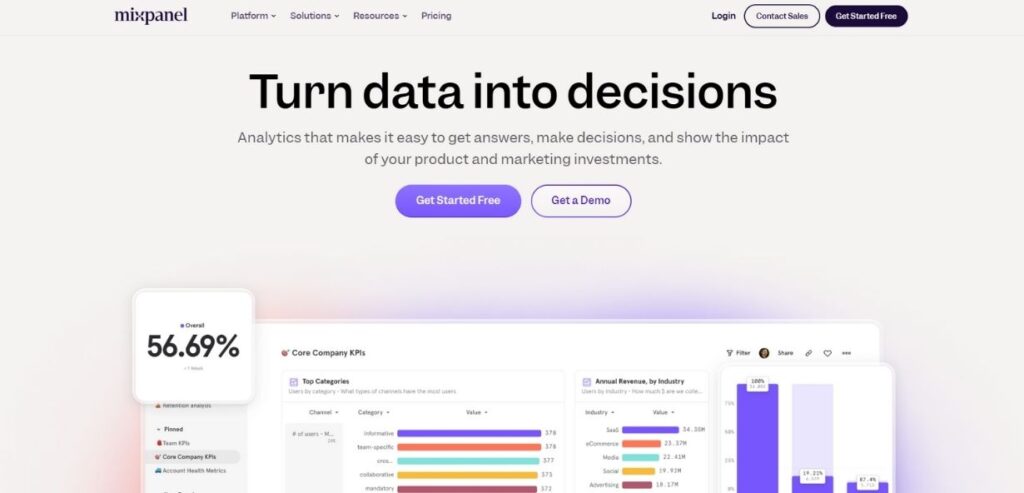
Users can improve their product experiences through Mixpanel because it operates as a tool for real-time product analytics data analysis. Business decisions are based on data because the tool delivers deep reports about engagement data along with retention and conversion metrics.
Key Features:
- Real-time event tracking
- Funnel and retention analysis
- AI-powered insights for user behaviour
Pros:
- Powerful event-based tracking
- Customisable reports
- Scalable for growing businesses
Cons:
- Steep learning curve
- Limited free plan features
- Requires technical knowledge
Pricing: Free plan available, paid plans start at $25/month
Website: www.mixpanel.com
6. Metabase
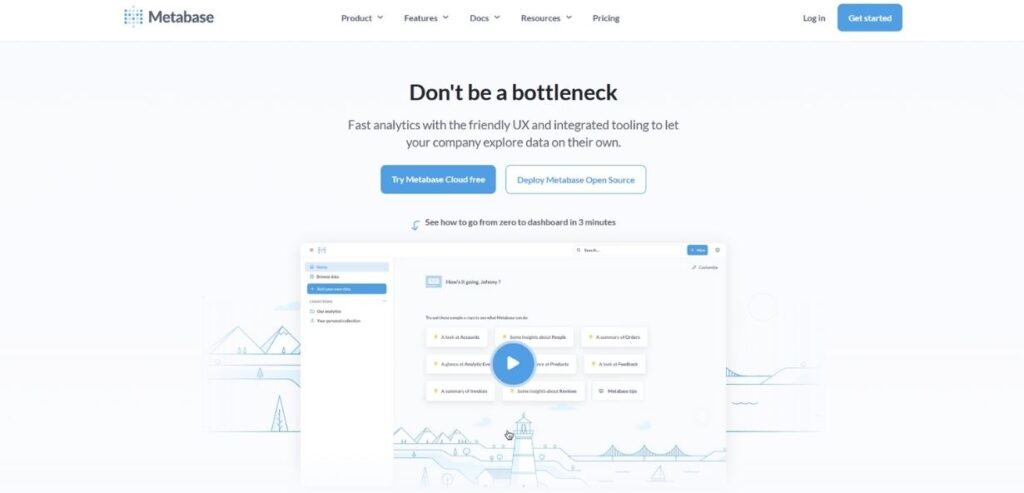
Metabase operates as an open-source business intelligence (BI) platform to give online stores accessible analytical solutions through its user-friendly interface. Users who lack programming experience can develop dashboards and create reports and visualize data through Metabase because it offers a friendly interface for all users. BI capabilities are available free of charge through the tool, making it suitable for established companies and newly founded enterprises.
Key Features:
- No-code query builder
- Interactive dashboards and visualisations
- Open-source with self-hosting options
Pros:
- Free and open-source
- Simple user interface
- Customisable and extensible
Cons:
- Lacks AI-driven insights
- Requires hosting for full functionality
- Limited customer support
Pricing: Free (self-hosted), Cloud version
starts at $85/month
Website: www.metabase.com
7. Tableau
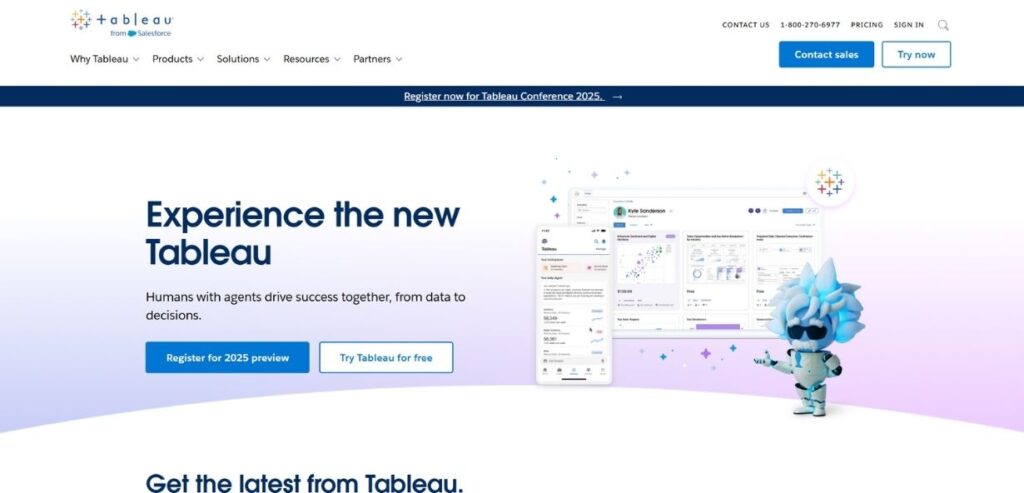
Tableau produces visualisations of eCommerce data analytics via its business intelligence analytics tools, which handle big data collections from businesses. The platform functions as a necessary tool that helps users build interactive dashboards which generate reports to spot market trends.
Key Features:
- Drag-and-drop data visualisation
- AI-powered data analysis
- Integration with multiple data sources
Pros:
- Advanced visualisation capabilities
- Scalable for enterprises
- Supports multiple data sources
Cons:
- Expensive for small businesses
- Requires training to master
- Performing analysis on big data collections causes system operation speeds to decrease.
Pricing: Starts at $75/user/month
Website: www.tableau.com
8. Power BI
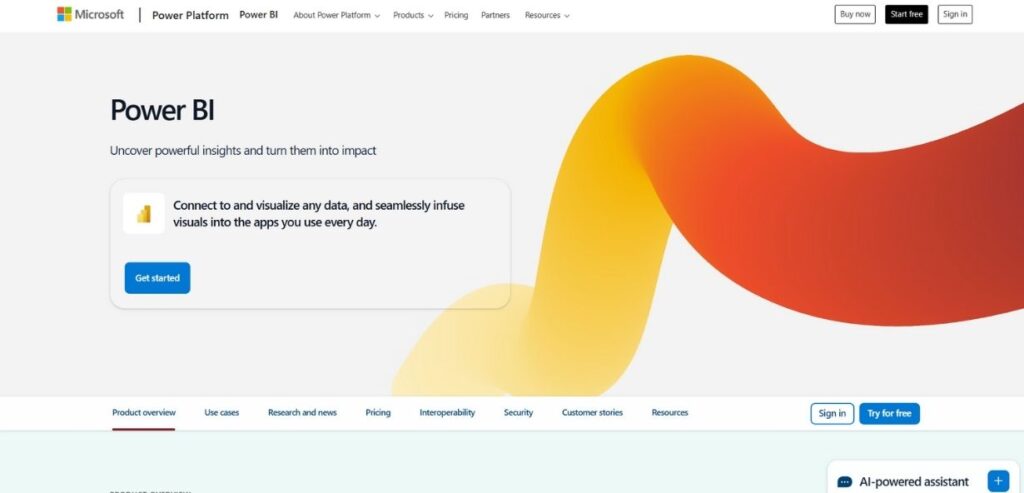
Business users benefit from Power BI as Microsoft’s Business Intelligence (BI) solution that consolidates and displays data from various systems. This tool delivers AI-enhanced insights and allows dashboard customisation and real-time analytics, therefore making it effective for eCommerce data analytics organisations that need performance and market pattern tracking. Power BI provides both small and large enterprises with Microsoft product integration coupled with cloud-based access, making it a suitable solution.
Key Features:
- AI-powered data analysis and visualisation
- Integration with Microsoft ecosystem (Excel, Azure, etc.)
- Real-time reporting and custom dashboards
Pros:
- Powerful data modeling
- Affordable for small businesses
- Strong community support
Cons:
- Requires technical expertise
- Steep learning curve
- Performance issues with large datasets
Pricing: Starts at $10/user/month
Website: www.powerbi.microsoft.com
9. Looker (Google Cloud)
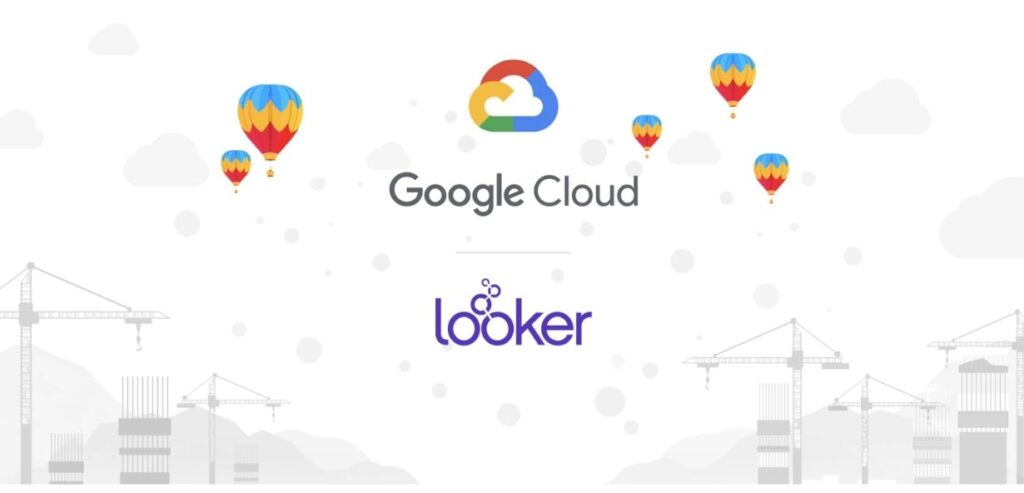
Users leverage Looker solutions based on cloud architecture design to retrieve real-time eCommerce analytics data while generating visualisations for their Looker data exploration. The data modelling features alongside storage options variety become possible because Looker operates as part of Google Cloud. The system offers adaptable operational features to organisations that need full analytical tools alongside collaborative features.
Key Features:
- Cloud-based, scalable BI platform
- Advanced data modeling with LookML
- Integration with Google Cloud and third-party tools
Pros:
- Highly customisable report
- Scalable for large businesses
- Strong collaboration features
Cons:
- Expensive for small businesses
- Requires SQL knowledge
- Steep learning curve
Pricing: Custom pricing
Website: www.looker.com
10. Heap Analytics
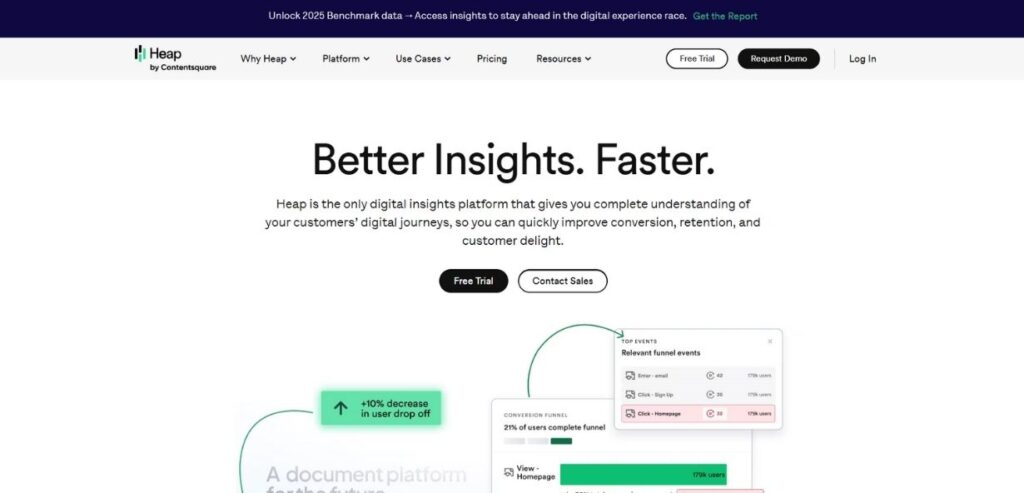
Users can operate without special configuration since Heap Analytics handles automatic event tracking across websites and applications that record all user movements. The tool provides an extensive analysis of customer behaviour and tracks conversion sequences to make it a vital system for expanding eCommerce data analytics markets.
Key Features:
- Auto-tracks all user interactions
- Advanced funnel and retention analysis
- AI-powered insights for customer behaviour
Pros:
- No coding required
- Real-time data tracking
- User-friendly interface
Cons:
- Expensive for advanced features
- Limited integrations
- It can be overwhelming for beginners
Pricing: Custom pricing, free plan available
Website: www.heap.io
11. Hotjar
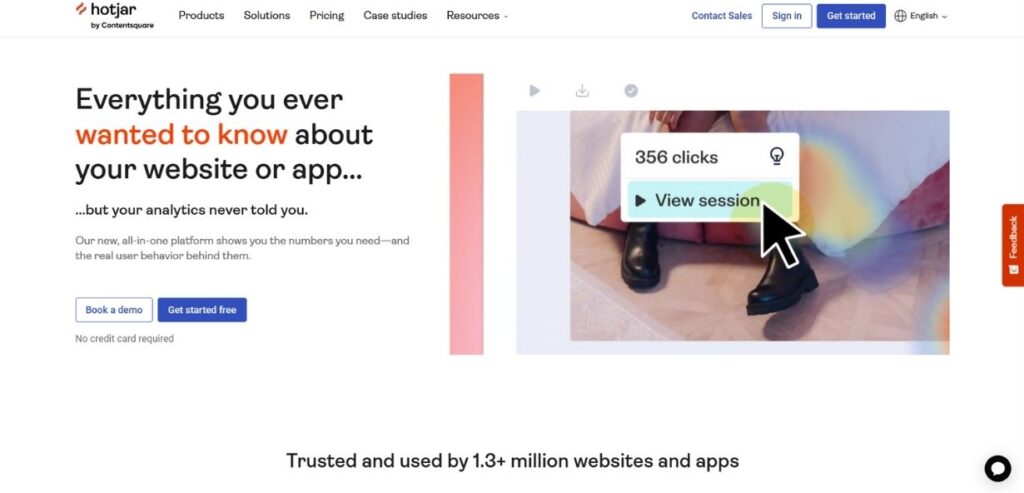
Hotjar operates as a behaviour analytics tool that helps businesses track user website behaviour by showing heatmaps while recording sessions and conducting surveys. Hotjar allows eCommerce businesses to monitor user activities while its behaviour analytics tools assist companies in designing better UX to increase conversions.
Key Features:
- Heatmaps for visual behaviour tracking
- Hotjar uses session recordings to analyse user interactions for their analysis goals.
- Customer feedback tools (polls, surveys)
Pros:
- Easy to set up
- Great for UX optimisation
- Affordable for small businesses
Cons:
- Limited integrations
- No real-time tracking
- Lacks deep data analytics
Pricing: Free plan available, paid plans start at $39/month
Website: www.hotjar.com
12. Crazy Egg
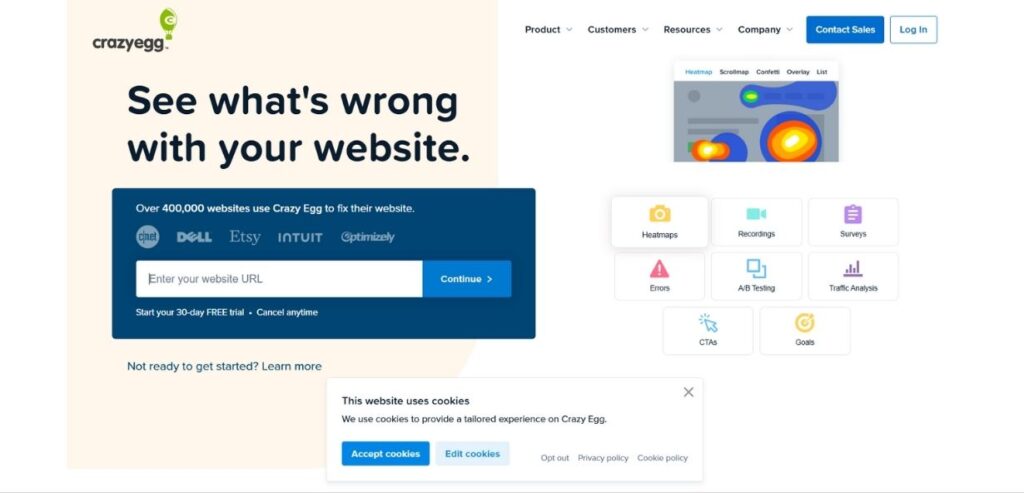
Crazy Egg enables users to enhance UX and conversions by using its optimisation tools that combine heatmaps with scroll maps and A/B testing functions. Website elements that get the most viewer interest from eCommerce data analytics customers can be identified by the tool, which also tracks their total page movements.
Key Features:
- Heatmaps and scroll tracking
- A/B testing for website optimisation
- Click reports for UX improvements
Pros:
- Easy to implement
- Affordable pricing
- Great for visual data analysis
Cons:
- Limited real-time tracking
- Not ideal for deep analytics
- Lacks advanced segmentation
Pricing: Starts at $29/month
Website: www.crazyegg.com
13. WooCommerce Analytics
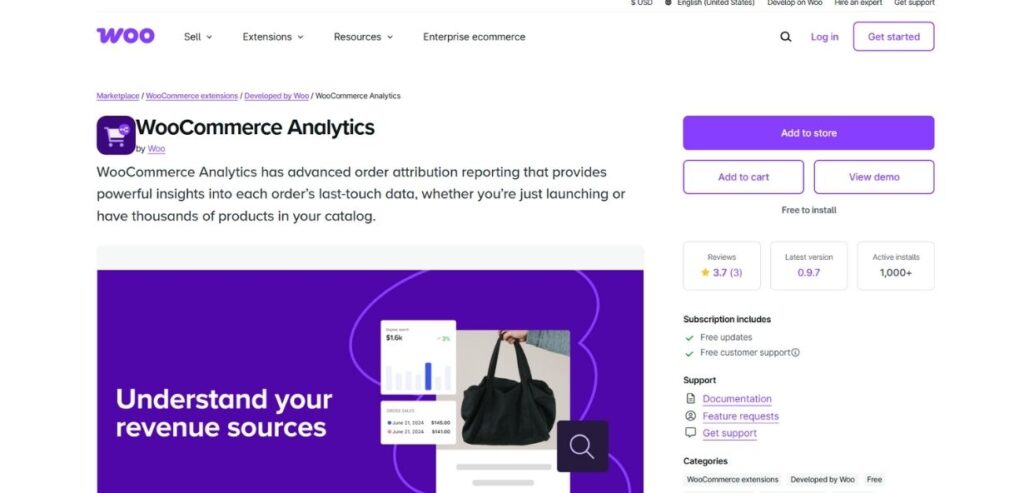
The built-in analytics platform for WooCommerce stores is known as WooCommerce Analytics. The tool generates essential business intelligence which enables store operators to enhance their marketing along with adjusting inventory allocation.
Key Features:
- Sales and revenue tracking
- Customer behaviour and order analysis
- Customisable reports and dashboards
Pros:
- Native integration with WooCommerce
- No extra cost for basic reports
- User-friendly interface
Cons:
- Limited advanced analytics
- The system needs plugin integration from external partners to gain deeper information
- No AI-driven predictions
Pricing: Free (included with WooCommerce)
Website: www.woocommerce.com
14. SEMRush
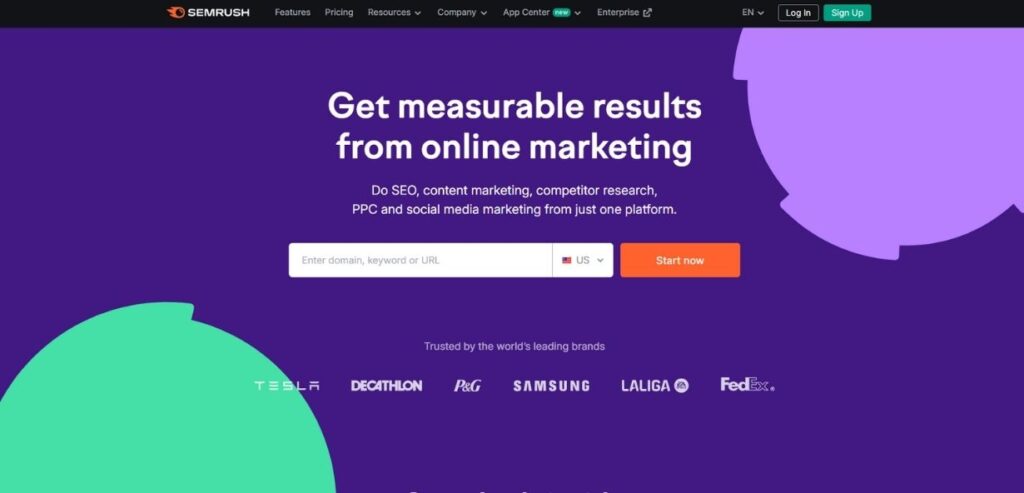
The SEMRush platform operates as a combination tool that performs SEO optimisation with traffic analytics to assist eCommerce companies. SEMRush helps organisations improve their search rankings and establish organic traffic growth by offering combined tools that analyse keywords and perform site examinations backlink tracking, and competitor comparison.
Key Features:
- Keyword and competitor analysis
- SEO site audit and backlink tracking
- PPC campaign optimisation
Pros:
- Comprehensive SEO tool
- Great for competitive analysis
- Helps with PPC and content marketing
Cons:
- Expensive for small businesses
- Steep learning curve
- Data can be overwhelming
Pricing: Starts at $129.95/month
Website: www.semrush.com
15. Optimizely
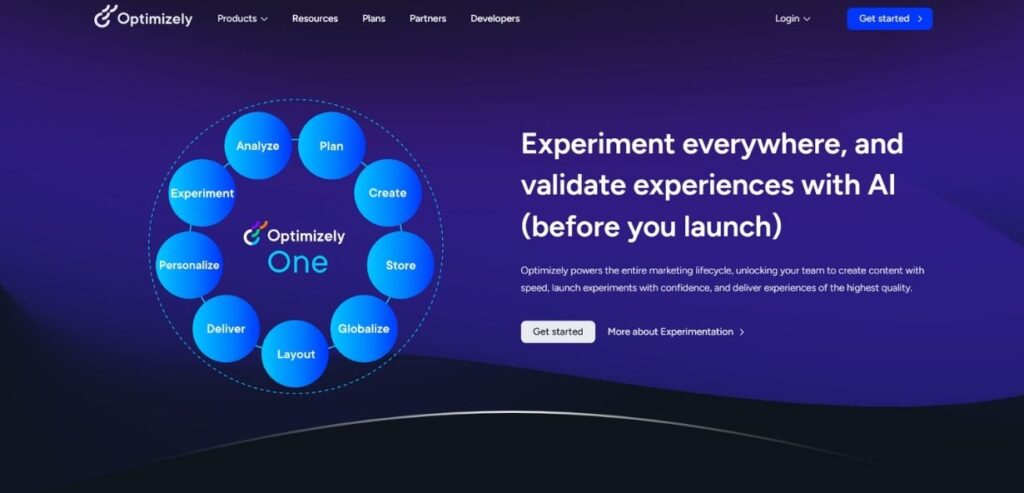
Businesses can utilise Optimizely as a system which joins A/B testing and experimental analysis to improve website products and marketing designs. ECommerce data analytics brands use this platform to operate variation tests that use quantitative data for conversion improvement decisions
Key Features:
- A/B and multivariate testing
- AI-powered personalisation
- Customer experience optimisation
Pros:
- Excellent for conversion rate optimisation
- AI-driven experimentation
- Scalable for large enterprises
Cons:
- High pricing for small businesses
- Requires technical expertise
- Limited free features
Pricing: Custom pricing
Website: www.optimizely.com
Factors to Consider When Choosing the Best eCommerce Data Analytics Tool
- Platform interfaces – simple interfaces enable users to manage their data evaluation procedures.
- Integration – Compatibility with your eCommerce platform, CRM, and other tools.
- Real-Time Analytics – Through real-time monitoring, organisations can execute quick decisions because of these monitoring utilities.
- Customization & Scalability – Business growth will become achievable through report customisation features together with flexible reporting changes.
- AI & Automation Features –Insights automation allows businesses to gain operational efficiency combined with accurate results.
- Pricing & ROI – The analysis of cost-effectiveness enables the determination of the added value between what services are received and their costs.
- Security & Compliance –Protection of both regulatory compliance and data privacy conditions is achieved through these measures.
Conclusion
Businesses should assess analytical tools by examining compatibility with existing systems together with easy controls designed for operations and planned growth needs. Companies with modest sizes experience larger sales potential when they identify appropriate data insights to make better decisions.
Manufacturing continuous eCommerce data analytics success requires implementing industry trend research through top analytics blogs and selecting the correct tool for your specific requirements. The essential nature of data analytics operations demands every business to allocate resources for supporting its digital competition success.
FAQs About eCommerce Data Analytics
1. What is the best eCommerce analytics tool?
A systematic assessment process must be performed when selecting an eCommerce analysis solution because different alternatives exist in the market. The combination of Google Analytics and Shopify Analytics serves users for their analytical needs as Mixpanel and Kissmetrics functions complement their requirements.
2. How does data analytics improve customer experience?
This examines the approaches analytics systems use to enhance customer satisfaction as its primary research topic. Through behaviour pattern tracking, businesses deliver personalised recommendation services and customised marketing deals to their target market.
3. Can small businesses benefit from eCommerce analytics?
Analysing eCommerce data analytics brings advantages to operations at the small business level. Businesses of all sizes achieve improved market performance and sales operations by analysing inventory products with analytic tools.
4. What metrics should I track in eCommerce analytics?
My work must concentrate on monitoring specific elements which appear in eCommerce analytics. As part of consumer analytics tracking, the core metrics include conversion rate together with CLV parameters alongside cart abandonment rates and traffic origin analysis.
5. Through what methods should I begin performing eCommerce analytics?
The strategic process starts by using Google Analytics before considering more advanced solutions if necessary.

